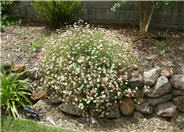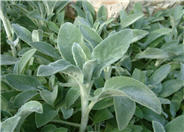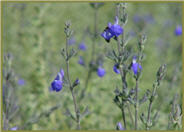
Common name:Spanish Lavender
Botanical name:Lavandula stoechas pedunculata
This dense shrub grows 2'-3' tall with blue-grey foliage and deep purple flowers that have large showy bracts in spring and summer near the top of the spikes. It has low watering needs once it's established. It prefers full sun. Foliage is aromatic.

Common name:Santa Barbara or Mexican Daisy
Botanical name:Erigeron karvinskianus
This low mounding perennial, with fine leaves and white to pinkish daisy-like flowers, is an excellent asset to rock gardens.

Common name:Eulalia Grass, Japanese Silver Gras
Botanical name:Miscanthus sinensis
Miscanthus sinensis is popular ornamental grass. Red flowers are held well above foliage clumps, appearing in summer, and may be cut for fresh or dry arrangements. Miscanthus needs full sun and watering at least once a week and more during hot summers. Foliage is variegated, with a thin white band down the center. This grass does great in coastal as well as warm inland valleys.

Common name:Lamb's Ear
Botanical name:Stachys byzantina
This tiny shrub will grow less than 1' tall and has medium-size, greyish-green leaves with blue and lavender flowers that bloom in the spring. This shrub is grown more for its velvety leaves than the flowers. It is drought tolerant once it's established. Be careful not to overwater.

Common name:Germander Sage
Botanical name:Salvia chamaedryoides
This low mounding perennial with a long bloom period, spreads by underground runners. It produces a small, silvery foliage which serves as a background for bright blue flowers. Bruised leaves have a spicy fragrance. Germander Sage reaches 1'-2' tall and wide. Heaviest blooms are in spring and early fall, but intermittent throughout the year. It requires full sun, well draining soil and is drought tolerant once it's established. Do not fertilize.
| Designer: T's Gardening | Black Walk |
Photographer: GardenSoft |
Soils and Compost:
Incorporate compost 6" into your soil to retain water, reduce compaction, feed earthworms, and provide valuable nutrients to your plants.
Water Saving Tip:
In general, lawns only need to be watered once every three days.
Check your irrigation controller and reduce watering times if necessary.
Integrated Pest Management:
Drip and other smart irrigation delivers water directly to roots, allowing no excess water for weeds.

